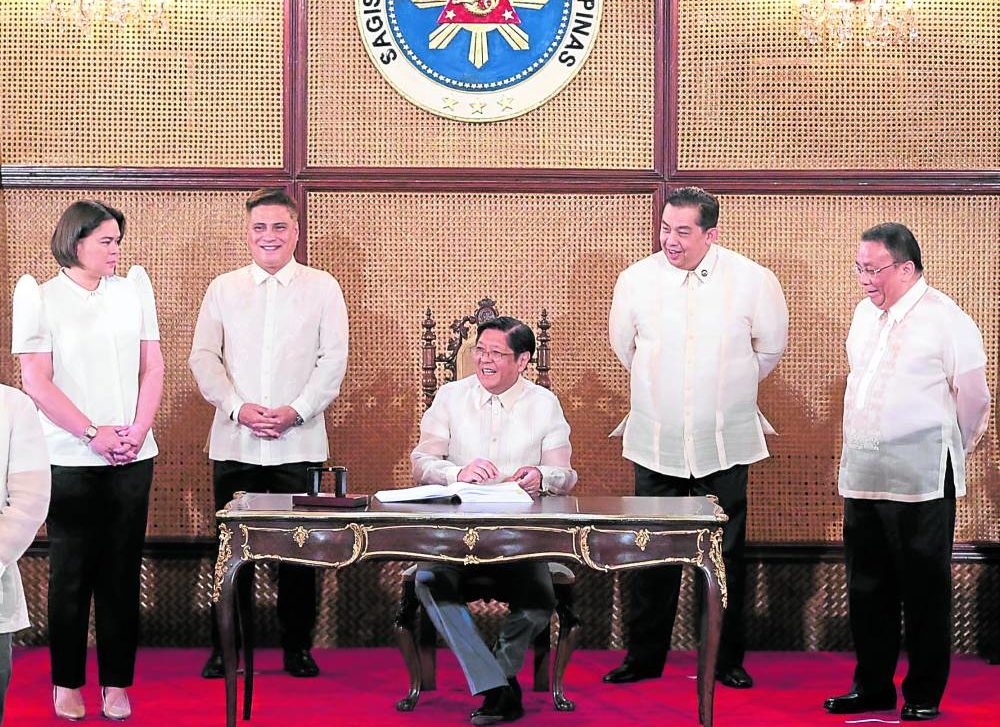Bongbong Marcos enacts his 1st nat’l budget: ‘For prosperity’

RECORD TIME President Ferdinand “Bongbong” Marcos Jr. looks pleased at the record time that he said Congress had approved the P5.268-trillion national budget for 2023 which he enacted on Friday in ceremonies at Malacañang. —MARIANNE BERMUDEZ
President Ferdinand “Bongbong” Marcos Jr. signed his first national budget on Friday, saying that the P5.268-trillion appropriation “defines and gives muscle” to his administration’s “many, many plans” for next year.
When he sent the National Expenditure Program, the basis for the national budget, to Congress in August, Marcos said that it was “anchored on our agenda for prosperity.”
He said then that the “overarching objective of economic transformation” of the country under his administration was to raise “real” gross domestic product (GDP) growth from 6.5 percent to 7.5 percent in 2022 to 6.5 percent to 8.0 percent annually from 2023 to 2028, which is the end of his term.
The nation’s prosperity will be seen in a 9-percent, or single-digit, poverty rate and a 3-percent national government deficit to GDP ratio by the time he steps down.
Marcos said he was aiming for less than 60-percent debt-to-GDP ratio in two years and an annual per capita income of at least $4,256, the supposed level for an upper middle income country. At the current exchange rate, that is equivalent to P236,378. According to the World Bank, the country’s annual per capita income is $3,548.8 (about P197.100).
Article continues after this advertisementNo specifics
The President did not specify the plans to be accomplished in 2023, but the distribution of the biggest allocations may give Filipinos an idea of where the President wants to take the country next year.
Article continues after this advertisementBased on the reconciled version of the budget passed by Congress, the Department of Agriculture, which the President heads, was given P178.7 billion, “an unprecedented increase” of 43.9 percent from this year’s allocation.
The Department of Education (DepEd), however, got the biggest share, amounting to P900.9 billion, including an also unprecedented confidential and intelligence fund of P150 million at the disposal of Vice President Sara Duterte, the education secretary. The Vice President’s office also got a P500-billion confidential fund.
The other large allocations went to the Department of Public Works and Highways (P881.9 billion), Department of Health (P334.9 billion), the Department of the Interior and Local Government (P255.3 billion), Department of National Defense (P234.9 billion), Department of Social Welfare and Development (P199.5 billion), Department of Transportation (P105.9 billion), Department of Justice (P54.9 billion) and Department of Labor and Employment (P44.8 billion).
The President, who had served in the House of Representatives and the Senate, said the approval of the budget by Congress was “the quickest and the fastest” he had seen so far.
The Department of Budget and Management submitted the National Expenditure Program to Congress on Aug. 22. The national budget was ratified by the Senate and the House on Dec. 5.
“We did it in record time,” Marcos said. “That is a significant, significant achievement.”
“And why is that important? Well, it is important because the budget is essentially the road map that we are going—that essentially defines and gives muscle to the road map of what we intend to do for the next year,” he said.
Marcos said the passage of the national budget, which is “sometimes regarded as a long, difficult, long-drawn-out process,” was approved quickly because it was “fully supported” by Congress.
Ready by New Year
“And that bodes well for us, seeing as we have many, many plans. There are many things that we need to do. There are many things that we would like to do. And we are slowly moving in that direction,” he said.
Marcos said Congress was “very cooperative” in making amendments to the budget measure necessary to his administration’s “financial policy.”
Both the Senate and the House are dominated by his supporters.
Speaker Martin Romualdez, a cousin of Mr. Marcos, said the money from the budget could be available as early as New Year’s Day, so the various agencies must be ready with their programs and projects.
“It is the most important and potent tool that President Marcos, his economic team and the entire government can use to accomplish the goals of the prosperity road map,” Romualdez said.
Senate President Juan Miguel Zubiri said the enactment of the budget assured funding for various government programs and projects for next year.
“I am very proud of the swift passage of our budget because this will allow our agencies and offices to go full speed ahead in service of our people,” he said.
In the budget deliberations, the senators and representatives were aware of the need for the government to make “productive investments in human and physical capital” to empower people, generate revenue and tackle pressing needs of Filipinos, said Senate finance committee chair Sonny Angara. 4.9% bigger
“We are no longer at a point where we are catching up and reacting to the developments just like the past two years. Now we can lay the foundation for the country to build on toward sustaining economic growth and providing more opportunities for our people,” Angara said. The 2023 budget is 4.9 percent bigger than this year’s P5.02-trillion appropriations.
Lawmakers restored the confidential and intelligence funds of DepEd despite criticisms over allocating such funds for a department not directly involved in law enforcement and national defense. During the bicameral conference committee deliberations, they also restored the P10-billion funding for the controversial National Task Force to End Local Communist Armed Conflict (NTF-Elcac). The House of Representatives had earlier slashed by P5 billion the NTF-Elcac’s funding for 2023. Budget Secretary Amenah Pangandaman on Wednesday said the President would veto two to three budget items but as of 5 p.m. on Friday, Malacañang had not released any veto message from Marcos.
RELATED STORIES
Marcos Jr. admin’s first full-year budget: A record P5.268 trillion in 2023
President certifies as urgent bill for proposed 2023 national budget